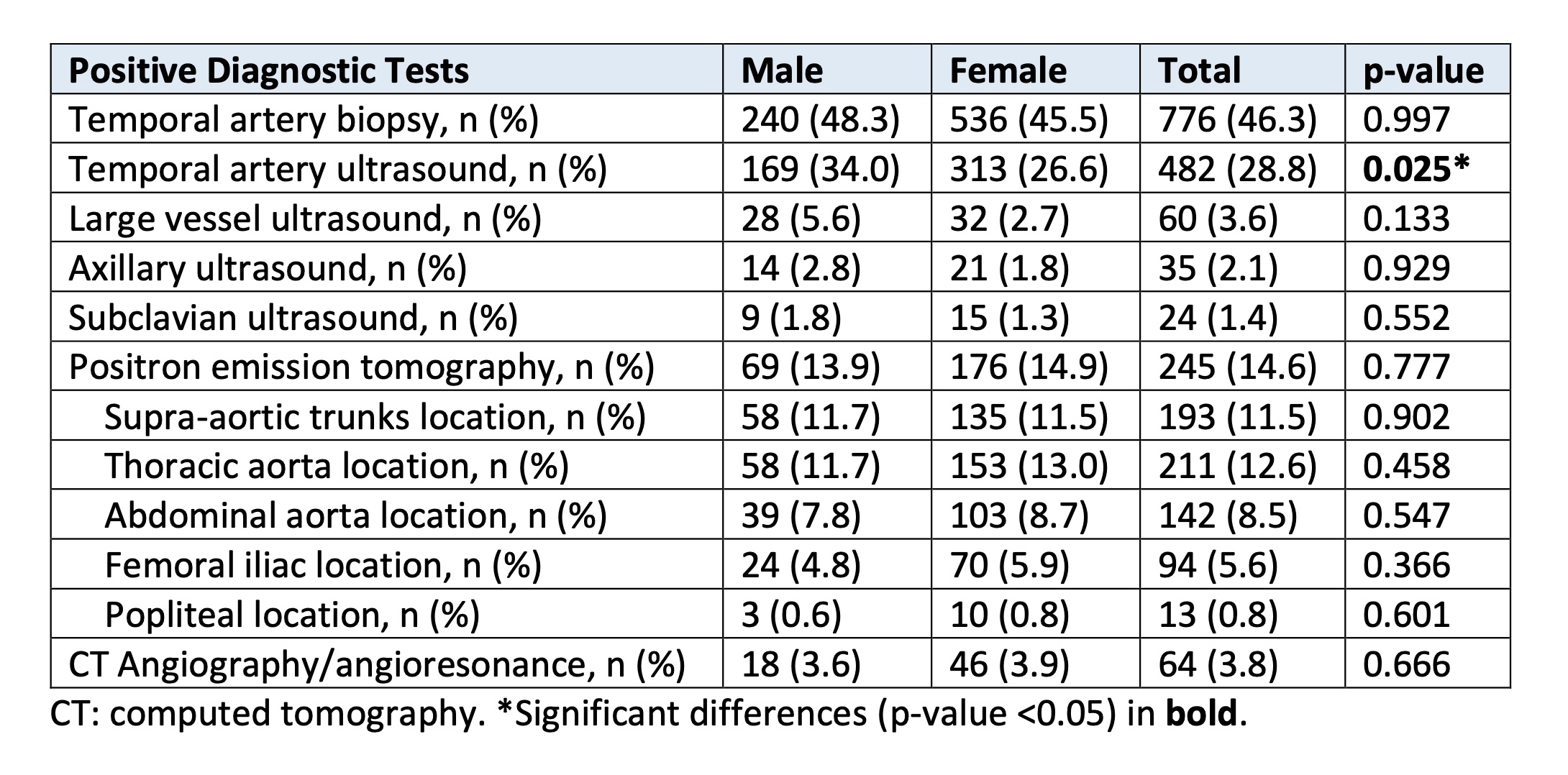Session Information
Date: Sunday, November 17, 2024
Title: Vasculitis – Non-ANCA-Associated & Related Disorders Poster II
Session Type: Poster Session B
Session Time: 10:30AM-12:30PM
Background/Purpose: Giant cell arteritis (GCA) is a predominantly female vasculitis. There are several studies that attempt to report the differences in the presentation of this disease between male and female with contradictory results. The main objective of this study was to determine whether there were differences in phenotype and imaging tests used for diagnosis between sexes in a large cohort of GCA.
Methods: ARTESER is a large Spanish multicenter epidemiological registry of GCA promoted by the Spanish Society of Rheumatology in which 26 national hospitals participated. The recruitment period was between June 2013 and March 2019. Standardized data were included for all patients diagnosed with GCA in these centers, including demographic, clinical, laboratory, imaging, temporal artery biopsy, and disease evolution data among others. Differences between sexes were compared in a bivariate analysis. The statistical analysis was performed by using STATA statistical package, V.13.1 and SPSS version 21.0.
Results: 1675 patients with GCA were included, 1178 women and 497 men, with higher annual incidence of GCA in the female group than in the male group (10.07 [95%CI: 8.7-11.5] vs 4.83 [95%CI: 3.8-5.9] cases of GCA per 100 000 people ≥50 years). The distribution of the disease by phenotypes showed a statistically significant higher frequency of the cranial and mixed phenotypes in males versus females (69.62% vs. 63.24%; p=0.012; and 13.68% vs. 8.66%; p=0.002, respectively). Results are shown in Table 1.
Focusing on the imaging examinations used for diagnosis, ultrasound of the temporal artery was positive in a higher percentage of men than women (34.0% vs 26.6%; p=0.025). No other differences were found between male and female population in the rest of the imaging techniques used (Table 2).
Conclusion: GCA predominated in women. The cranial and mixed phenotypes were more frequent in males. Temporal artery ultrasound had more positive results in males than in females.
To cite this abstract in AMA style:
Fernández-Lozano D, Domínguez-Álvaro M, Narvaez-García J, Garrido-Puñal N, De Miguel E, Estrada-Alarcón P, Hernández-Rodríguez I, Silva-Diaz M, Belzunegui J, Moriano C, Sánchez-Martín J, Calvo I, Aldasoro V, Abasolo Alcazar l, Loricera J, Moya P, García-Villanueva M, Sánchez-Alonso F, Castañeda S, Hernández J, Blanco-Alonso R. Sex Differences in Phenotypes and Imaging Examination in Giant Cell Arteritis: Data from the ARTESER Registry [abstract]. Arthritis Rheumatol. 2024; 76 (suppl 9). https://acrabstracts.org/abstract/sex-differences-in-phenotypes-and-imaging-examination-in-giant-cell-arteritis-data-from-the-arteser-registry/. Accessed .« Back to ACR Convergence 2024
ACR Meeting Abstracts - https://acrabstracts.org/abstract/sex-differences-in-phenotypes-and-imaging-examination-in-giant-cell-arteritis-data-from-the-arteser-registry/


